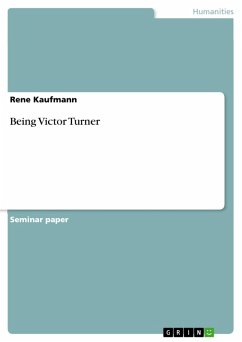Seminar paper from the year 2004 in the subject Ethnology / Cultural Anthropology, grade: 1,0, University of Heidelberg (Institut für Ethnologie), course: Anthropology and Literature, language: English, abstract: In 1999, a very postmodern movie entered the programs of movie theatres: Being John Malkovich. In this extraordinary piece of film, unemployed puppeteer Craig Schwartz makes a bizarre discovery. Being hired as a file sorter, Schwartz discovers a little door in the 7 1/2 story of his new workplace, which leads right into the brain of actor John Malkovich. He can see, hear, smell and feel what Malkovich does. What a desirable notion for an anthropologist. No more speculation about the motives, norms, relations or beliefs that makes humans think and do certain things. Beyond ethnography, it could be even more fascinating to find out what the fathers of our own professional lineage caused them to perceive the anthropological subject in specific ways. The following account is foremost an experiment in the creative possibilities of rethinking anthropological theory. I want to gain an insight into the life and work of Victor Turner by partly playing his role in this paper. How do I legitimize this unconventional analysis? I see it as a logical consequence of postmodern thinking and practice. If the "Self" and the "Other" are categories of thought rather than discrete entities, I see no reason why I should not speak with the voice of the Other. Also, as we are diagnosed to be subjective, why not include subjective fictional elements in our writing? My paper does not follow the exact rules of general scientific writing as to coherence, style and precision of facts. But in a Batesonesque experiment I apply his method of loose and strict thinking (Bateson 1973: 47-49) to approach the life and work of Victor Turner. By participating in the identity and biography of Victor Turner I observe his specific way of thinking. The major part of the paper deals with Victor Turner¿s personal and academic life which are closely linked to his notions of culture, ritual and the anthropological subject. The final section will briefly discuss the connections of (auto)biography and anthropology from a theoretical viewpoint.
Dieser Download kann aus rechtlichen Gründen nur mit Rechnungsadresse in A, B, BG, CY, CZ, D, DK, EW, E, FIN, F, GR, HR, H, IRL, I, LT, L, LR, M, NL, PL, P, R, S, SLO, SK ausgeliefert werden.


